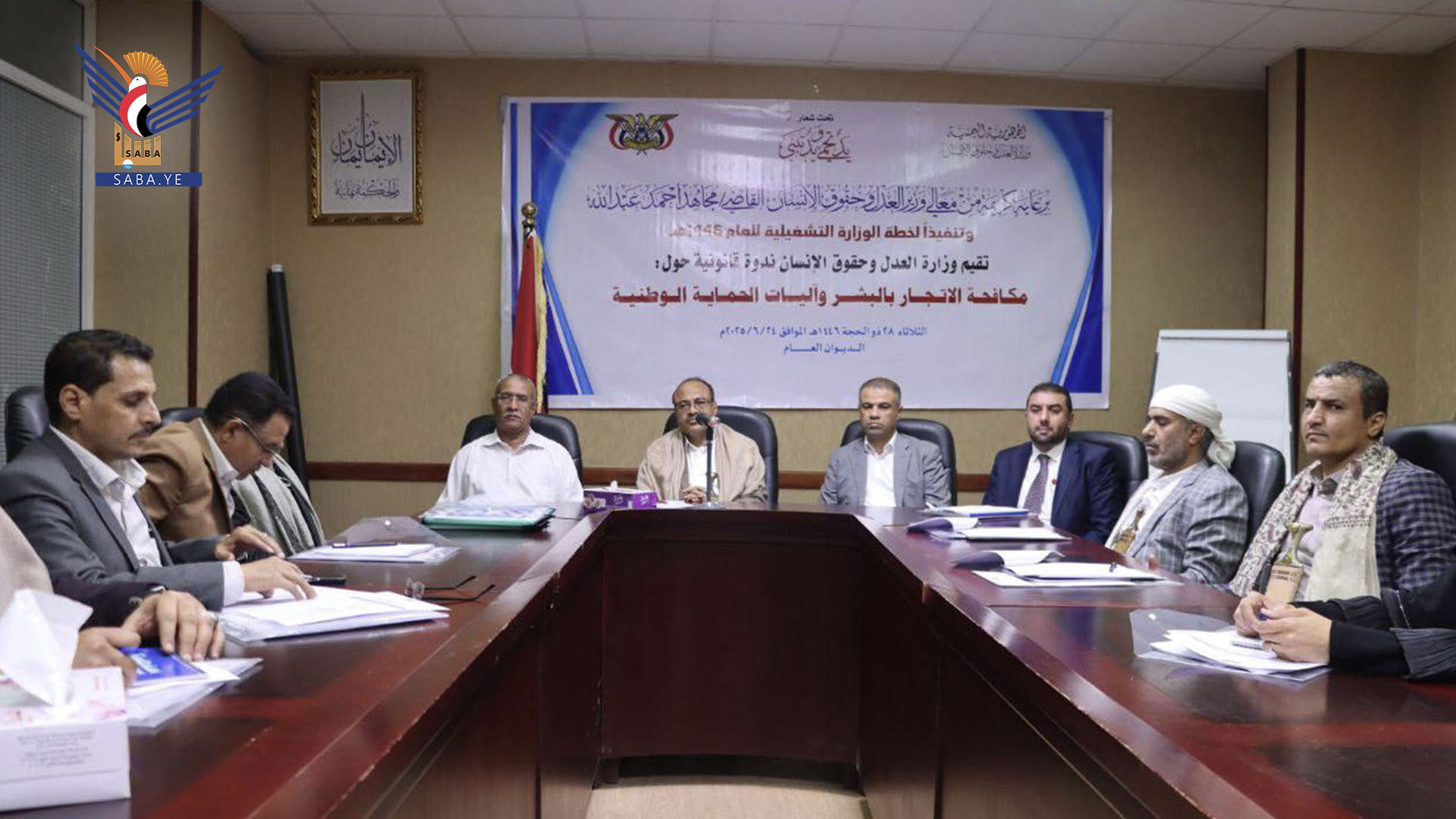Sana'a – Saba:
Ministry of Justice and Human Rights on Tuesday hosted a specialized legal seminar focused on combating human trafficking crimes and strengthening victim protection mechanisms.
The event emphasized activating national anti-trafficking laws and boosting victim safeguarding efforts amid calls for the swift formation of a national anti-trafficking committee.
The seminar saw the participation of 26 judges and staff from the Ministry and the Human Rights Commission.
Justice and Human Rights Minister Judge Mujahid Abdullah outlined the challenges to effective law enforcement. Abdullah stressed the urgent need for widespread awareness campaigns across courts, communities, and security agencies.
This involves enhancing public awareness of the dangers of human trafficking and reporting mechanisms, with active participation from the Ministry's Public Relations and Media departments and the National Human Rights Commission.
This focuses on implementing the law through police, judicial enforcement bodies, public prosecutions, courts, and accompanying training programs. It also includes pursuing perpetrators domestically and internationally, and establishing a system to monitor and track human trafficking crimes within Yemen or against Yemenis abroad.
Judge Abdullah described these crimes as organized and potentially linked to terrorism, emphasizing the Ministry, National Human Rights Commission, Public Prosecution, and security agencies must prioritize their enforcement as part of combating organized crime.
The judge also underscored the importance of following up on criminal judgments in such cases and reiterated the call for the rapid establishment of the national anti-trafficking committee as a crucial coordinating framework.
Deputy Minister of Justice and Human Rights Judge Ibrahim al-Shami hailed the seminar as a significant step towards building a comprehensive legal system for combating human trafficking and protecting victims.
Al-Shami affirmed the Ministry's commitment to prioritizing this issue, stressing the need for continued specialized seminars and expanded coordination with relevant judicial and security authorities. The goal, he said, is to translate legal texts into effective practical procedures that achieve protection and justice.
Head of the Technical Office at the Ministry of Justice and Human Rights Judge Khaled al-Baghdadi highlighted that the seminar is part of the Ministry's ongoing efforts to confront this dangerous, organized, and transnational crime.
He noted that human trafficking is a blatant violation of human dignity, targeting the most vulnerable groups, particularly women and children, by exploiting poverty and need, asserting necessitates serious collective action to counter its spread.
Al-Baghdadi pointed out that the Government of Change and Construction has approved the draft executive regulations for the Anti-Human Trafficking Law, along with special bank account regulations. This "qualitative step" aims to enhance legal and financial protection mechanisms against this crime, ensuring victims receive necessary support while perpetrators are brought to justice. These laws and regulations also seek to establish an effective national strategy for preventing all forms of human trafficking.
Head of the Human Rights Sector at the Ministry Ali Tayseer explained that human trafficking crimes are old but constantly evolving, noting the development of new methods for their commission. He provided a simplified explanation of human trafficking, highlighting its prevalence in Yemen due to the conditions of aggression and siege, considering forced begging as one form of it.
Tayseer emphasized the importance of upholding human dignity as divinely ordained and expressed hope that the Anti-Human Trafficking Law would be fully implemented to completely address this crime.
The seminar's two working sessions, chaired by Judge Dr. Mohammed al-Wareth, Head of the Ministry's Anti-Human Trafficking Unit, discussed the legal definition of human trafficking, its primary forms of criminal behavior, types of exploitation outlined in the 2018 Yemeni Anti-Human Trafficking Law, and the legal means and measures to protect victims and ensure their rights.

| more of (Local) |




